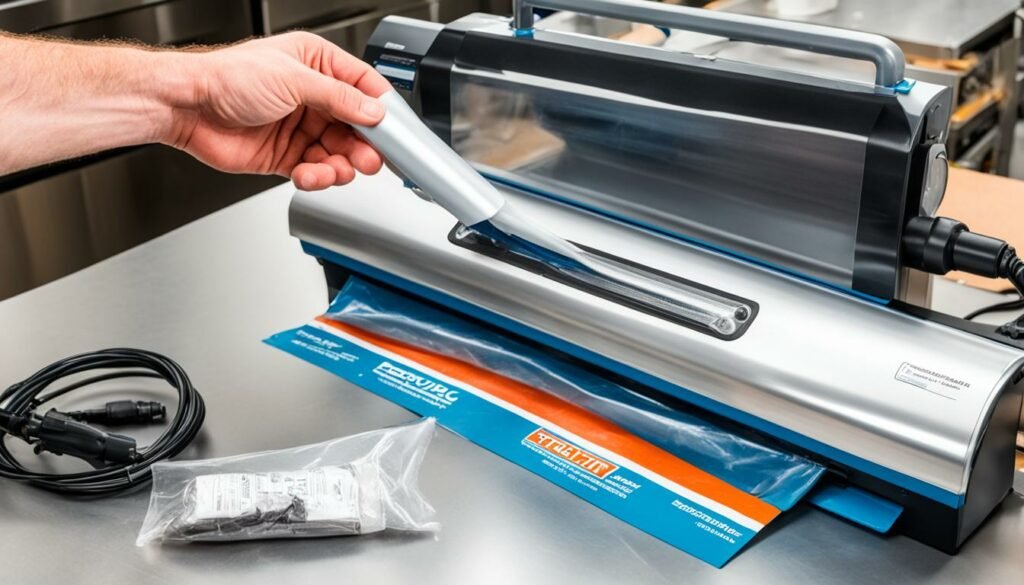Have you ever faced a dead vacuum sealer right when you needed it? The moment you planned to save your food, it doesn’t work. The bright side is, learning to troubleshoot the power can change everything.
Picture you’re all set for a family feast but your sealer won’t switch on. It’s your essential tool for food prep. Before you hit the panic button, know our guide has tips to fix this and save your day.

We cover everything, from checking cords to diving into the internal parts. Preventing these power issues is key. It keeps your sealer in top shape to keep your food fresh. Let’s work together to solve this, no matter your sealer brand.
Common Causes of Vacuum Sealer Power Problems
A vacuum sealer may not turn on due to issues with its power cord. Problems with the power supply or internal parts can also cause this. Let’s look closely at these common problems:
Power Cord Issues
If the power cord is damaged, your vacuum sealer might not start. Always check the cord for any tears or exposed wires. It’s important that the cord is in good condition and firmly plugged in. Doing regular checks can prevent serious power issues.
Power Supply Problems
One big reason for a vacuum sealer not starting could be a faulty power supply. Ensure the outlet works and that the sealer is correctly plugged in. For those that run on batteries, ensure they are fully charged. Use the correct power to avoid damaging your sealer’s parts.
Internal Component Failures
Malfunctioning internal parts, like the vacuum pump, can cause power issues too. To avoid parts overheating, wait about 20 seconds between vacuuming. Cleaning the seals or gaskets is advised to prevent them from blocking. Also, make sure the drip tray isn’t full and use the right bags.
Using bags with texture can help improve air removal. Ensure bags and accessories are placed correctly for them to work well. For more help, visit websites like Foodsaver not vacuuming. Watch out for mechanical problems, like broken parts, which might need professional repair.
It’s important to do regular maintenance on your vacuum sealer. Troubleshooting tips often include simple checks and cleanings. This keeps the sealer running smoothly.
Inspecting and Replacing the Power Cord
Is your vacuum sealer not working? Start by checking its power cord. If it’s not working, the power cord might be the problem. Look for any cuts or tears on the cord. By doing this, you can use your sealer safely and well.
Check the power cord for wear and tear. If you find any damage, replace the power cord. A bad cord can both stop your sealer from working and be dangerous.
It’s also important to make sure the plug and socket connections are secure. Loose or damaged connections can cause problems. Keeping these areas secure helps the vacuum sealer work without trouble.
When you need to replace the cord, it’s best to get help from an expert. An electrician can install the new cord safely. Yes, you could do it, but a pro will make sure it’s done right and safely.
Do you need to check or replace your vacuum sealer’s power cord? Here’s how:
- Unplug the Vacuum Sealer: Always start by disconnecting the machine from the power source.
- Visual Inspection: Examine the power cord for any visible damage or fraying.
- Check Connections: Ensure that the plugs and sockets are firmly connected and not loose.
- Professional Replacement: If damage is found, contact a professional electrician to replace the cord safely.
Troubleshooting the Power Supply
First, check that the power cord works well. Next, look into vacuum sealer power supply troubleshooting. Make sure the wall outlet has the right power. The vacuum sealer needs the correct voltage and current to run well.
Here’s a detailed guide to help fix your vacuum sealer’s power supply issue:
- Verify Wall Outlet: Try plugging in a different device. If it doesn’t work, the outlet might be the issue.
- Use a Multimeter: Measure the outlet’s voltage. It should match the sealer’s needs as written in the manual.
- Inspect the Circuit Breaker: Make sure the breaker hasn’t tripped. If it has, reset it and try the sealer again.
- Examine the Machine’s Circuitry: Look closely at the inside for damage, like burnt parts or loose wires.
- Consult the Manual: Always check the manual for detailed steps on electrical problems.
To make troubleshooting easier, know these common voltage and current needs:
| Brand | Voltage (V) | Current (A) |
|---|---|---|
| FoodSaver | 120 | 15 |
| VacuumMaster | 220 | 10 |
| Nesco | 110 | 12 |
With this knowledge and our steps, you can fix vacuum sealer electrical supply problems effectively.
Fixing Internal Component Failures in Vacuum Sealers
Vacuum sealers can have big issues if their internal parts fail. We’ll look at problems with the control board, vacuum pump, and heat seal strip. Fixing these parts can often solve a lot of the problems.
Checking the Control Board
A vacuum sealer might not turn on if the control board has issues. Look for signs like burns or loose parts. These might mean the vacuum sealer control board needs fixing. If it looks bad, you should replace it to make the sealer work again.
Repairing or Replacing the Vacuum Pump
The vacuum pump is very important too. After a while, it might get blocked or worn out. You can start by cleaning it. If that doesn’t work, you might need to get a new vacuum pump. This keeps the sealer working well.
Maintaining the Heat Seal Strip
Keeping the heat seal strip in good shape is crucial. If it’s worn out, the sealer won’t seal right. Check it often for damage and clean it regularly. If it’s damaged, swapping it out can make your sealer seal better.
Preventive Maintenance Strategies
It’s key to do vacuum sealer maintenance regularly for long life. It makes seals better and cuts breakdown risks. Every day, check the machine before using it. Catching problems early keeps it running well.
Lube the parts weekly to reduce wear. Each month, change parts if needed, clean deeply, and adjust settings. This keeps your machine working at its best.
For issues like bad seals, check the heat and pressure settings. Use the manufacturer’s guide for help. Fast problem-solving saves money on repairs.
See below for a list of tasks and how often to do them:
| Task | Frequency |
|---|---|
| Wipe Seal Bar | Daily |
| Inspect for Damage | Daily |
| Lubricate Moving Parts | Weekly |
| Deep Clean | Monthly |
| Calibrate Settings | Monthly |
| Replace Worn Parts | Monthly |
Use safe cleaners and don’t overfill bags for safety and longer life. Well-trained staff keeps from overworking your machine.
Software can make tracking maintenance easy and save money. Adjust your plan based on what works best for you.
Following these vacuum sealer maintenance tips will make your equipment last longer and work better.
When to Consult a Professional Technician
Got ongoing issues with your vacuum sealer’s power? Sometimes, trying to fix it yourself isn’t the best idea. It might be time to have an expert look at it. Especially if you tried to fix it and the problem remains. Things like power not turning on, pump issues, or problems with controls often need a pro’s touch.
Signs You Need Expert Help
If you see these signs, it’s probably time to call in a professional:
- Repeated Power Failures: Is your PowerXL™ Duo NutriSealer™ constantly shutting down or not turning on? Despite your best efforts, it might be time to have someone who knows what they’re doing take a look.
- Malfunctioning Vacuum Pump: A vacuum pump that’s still faulty after simple fixes will need a closer, expert inspection.
- Control System Errors: Issues with the control board or heat seal strip that don’t go away even after you did what the manual said, are best handled by someone skilled in the trade.
- Persistent Refrigerator Problems: While some fridge repairs are DIY-able, ongoing troubles require professional attention to prevent them from getting worse.

Choosing the Right Service Provider
When expert help is a must, picking the right person is crucial. Look for someone with a track record of success. Places like VEVOR or Utien are good bets. They know their stuff and can get your machine back to running as it should.
| Service Provider | Expertise | Customer Reviews |
|---|---|---|
| VEVOR | Specializes in vacuum sealer repairs | Highly rated for quick and effective service |
| Utien | Known for comprehensive appliance repairs | Renowned for customer satisfaction |
Picking the right professional can save you from wasting time and money. It ensures the problem is fixed properly from the get-go.
Conclusion
We’ve covered key steps in fixing vacuum sealer power problems in this guide. We looked at common issues like power cord, supply, and component breakdowns. For each, we offered practical solutions to resolve these issues.
It’s vital to check the power cord and power supply, and fix inner parts like the control board and vacuum pump. Doing regular maintenance work is important. This helps your sealer work better and stops it from breaking down suddenly.
Knowing when to get help from a professional is very important. We talked about signs you need expert help and how to pick a good repair service. Following these steps will keep your sealer in good shape. It will help you keep your food fresh longer.
FAQ
Why is my vacuum sealer not turning on?
A vacuum sealer might not turn on due to various issues. These can include a damaged power cord, power supply problems, or internal faults. It’s important to look closely to find the exact problem.
How do I troubleshoot vacuum sealer power problems?
Start with looking at the power cord for any harm. Check the power supply. Also, examine parts like the control board, vacuum pump, and heat seal strip for issues.
What should I do if my vacuum sealer has a damaged power cord?
If you find the power cord damaged, change it with help from a pro. This step makes sure repairs are done safely and without risk.
What are common causes of power supply issues in vacuum sealers?
Many issues can cause power supply problems. This includes things like a bad wall outlet or electrical faults. Make sure your power source is working smoothly.
How can I maintain my vacuum sealer to prevent power problems?
To prevent issues, keep your sealer clean and use the right bags. Also, store it in a safe place. Doing these things will help your sealer work well for a longer time.
When should I consult a professional technician for vacuum sealer power issues?
If you’ve tried to fix power problems but they keep happening, get help. This is especially true if the vacuum pump doesn’t work well or if there’s a problem with the control system.
How do I check the control board of my vacuum sealer?
To check the control board, look for any obvious damage or failure. If you’re not sure, it’s best to have a technician check it for you. They can offer advice and do any needed fixes.
What should I look for in a professional vacuum sealer repair service?
When picking a repair service, look for one with solid experience in fixing vacuum sealers. Companies like VEVOR and Utien are known for their quality work. They can help fix your sealer well.
